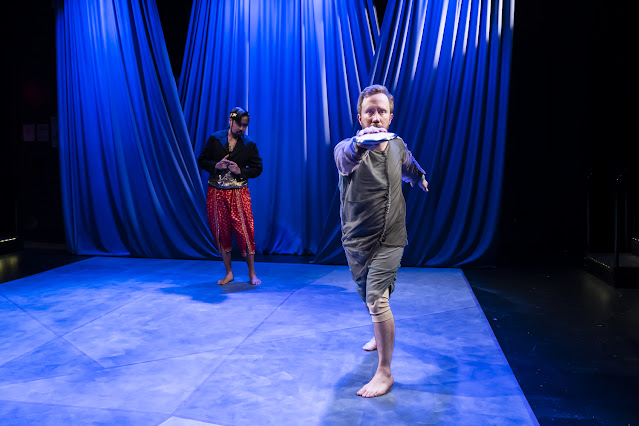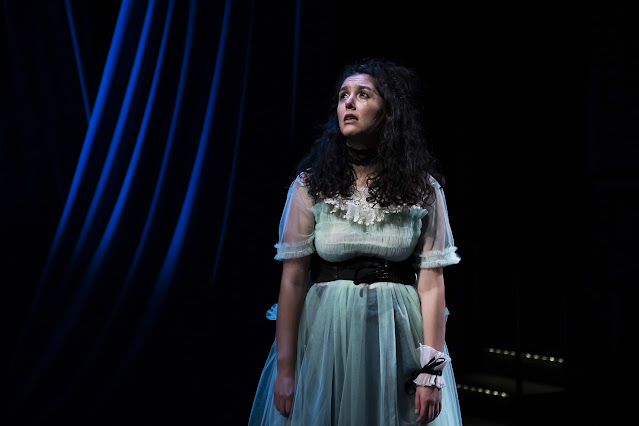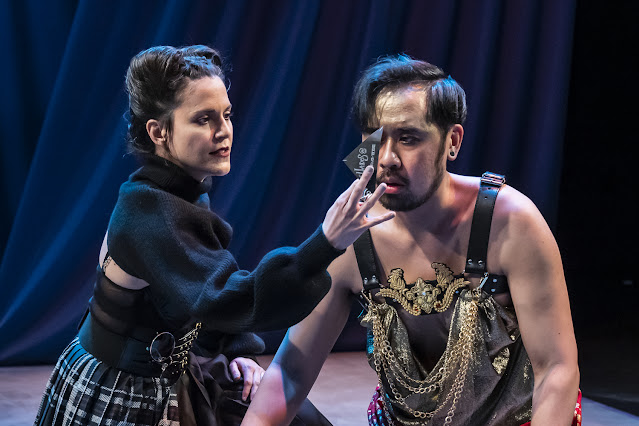Discus
Written by Becca Schlossberg
Directed by Jenn Susi
502 W 53rd St., Manhattan, NYC
March 19-26, 2022
 |
| Patrick T. Horn as Hyacinth with Philip Estrera as Apollo in background. Photo by Al Foote III. www.alfoote3photography.com |
Passion, guilt, power, jealousy, grief: these fixtures of Greek myth have lost none of their relevance for audiences over time, as Hunger and Thirst Theatre demonstrates with its latest production. Hunger and Thirst reimagines classic stories for contemporary audiences, and playwright Becca Schlossberg's
Discus brings a fresh and, for an essentially tragic tale, tremendously fun version of the myth of Hyacinth and Apollo to the stage. In a very funny scene early in the play, Apollo (Philip Estrera) is hosting a benefit for mortals, and
Discus gives you too a way to help out the human race: tickets for
Discus are $20.00, but audience members can also purchase $10.00 tickets if they pledge to bring a minimum of two canned or non-perishable food donations to the theater for a food drive in support of the
West Side Campaign Against Hunger at the Church of St. Paul and St. Andrew.
In the myth of Hyacinth and Apollo, the former, a prince of Sparta, is admired by several beings both mortal and immortal. He becomes Apollo's lover but is eventually violently struck with a discus, either by accident (an unlucky bounce from a throw by Apollo) or through the divine intervention of a jealous immortal, depending on the version. Schlossberg adapts the second version, which allows for a richer exploration of questions of personal culpability and change.
Discus also pares the romantic competition for Hyacinth (Patrick T. Horn) down to a triangle involving Apollo and Zephyrus (Alejandra Venancio), the latter of whom is a daughter of the Titans rather than of the Olympians who overthrew them. As Hyacinth, who is training for Apollo's games, becomes closer to the god, he ceases to maintain his existing entanglement with Zephyrus. But as Zephyrus makes sure to tell Hyacinth, Apollo doesn't have the most spotless record when it comes to his behavior towards humanity, individually or
en masse. Will this time be any different?
 |
| Alejandra Venancio as Zephyrus. Photo by Al Foote III. www.alfoote3photography.com |
From the beginning,
Discus gives us immortals who pass the time by flirting, plotting, and gossiping–Rita McCann and Alexander Settineri are hugely entertaining as Zephyrus's catty wind-god siblings Notos and Boreas–but some of them do come to learn from experiencing love and loss as humans do (playing, perhaps, with the way that we think of myths as holding lessons for humans). The characters point out that loneliness inheres, in different forms, in both mortality and immortality, and both Apollo and Hyacinth experience some surprises as they learn about each other and struggle over the terms of their relationship, while Apollo simultaneously struggles with who he was, is, and will be. Strip away the supernatural aspects, and the pair could be navigating any relationship with a substantial power differential. In the end, Apollo's explicit association of the flower that bears Hyacinth's name with hope and change can be viewed not only as an expression of love but also as linking a queer past to a queer(er) future.
 |
| Victoria Fragnito as Hades and Philip Estrera as Apollo. Photo by Al Foote III. www.alfoote3photography.com |
The sharply directed
Discus creates a vivid world on a bare stage with draped fabric evoking Grecian dress as a backdrop. Costumes (by Christopher Metzger with Kat Karl) that utilize a striking mix of influences and effective sound design (courtesy of Randall Benichak) support an irreproachable cast. Victoria Fragnito makes a brief but memorable appearance as an imperious Hades, and Patricia Lynn blends disaffection, anger, and tenderness as Apollo's twin, Artemis, whose experience with her mortal lover Orion offers a parallel to that of her brother (in another kind of paralleling, the play also makes smart use of doubling at one point). Horn and Estrera are equally and affectingly at home with the initial sweetness of Hyacinth and Apollo's relationship as they are with its later bend towards tragedy, an arc mirrored in Venancio's artful turn as an increasingly haunted Zephyrus. While Hyacinth himself may never have made it to Apollo's games,
Discus is worthy of a wreath of laurels.
-John R. Ziegler and Leah Richards






Comments
Post a Comment